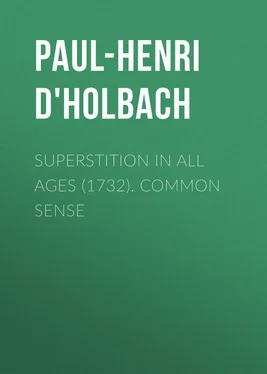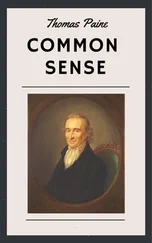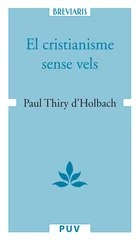Paul-Henri Holbach - Superstition In All Ages (1732). Common Sense
Здесь есть возможность читать онлайн «Paul-Henri Holbach - Superstition In All Ages (1732). Common Sense» — ознакомительный отрывок электронной книги совершенно бесплатно, а после прочтения отрывка купить полную версию. В некоторых случаях можно слушать аудио, скачать через торрент в формате fb2 и присутствует краткое содержание. Жанр: Философия, literature_18, foreign_prose, на французском языке. Описание произведения, (предисловие) а так же отзывы посетителей доступны на портале библиотеки ЛибКат.
- Название:Superstition In All Ages (1732). Common Sense
- Автор:
- Жанр:
- Год:неизвестен
- ISBN:нет данных
- Рейтинг книги:3 / 5. Голосов: 1
-
Избранное:Добавить в избранное
- Отзывы:
-
Ваша оценка:
- 60
- 1
- 2
- 3
- 4
- 5
Superstition In All Ages (1732). Common Sense: краткое содержание, описание и аннотация
Предлагаем к чтению аннотацию, описание, краткое содержание или предисловие (зависит от того, что написал сам автор книги «Superstition In All Ages (1732). Common Sense»). Если вы не нашли необходимую информацию о книге — напишите в комментариях, мы постараемся отыскать её.
Superstition In All Ages (1732). Common Sense — читать онлайн ознакомительный отрывок
Ниже представлен текст книги, разбитый по страницам. Система сохранения места последней прочитанной страницы, позволяет с удобством читать онлайн бесплатно книгу «Superstition In All Ages (1732). Common Sense», без необходимости каждый раз заново искать на чём Вы остановились. Поставьте закладку, и сможете в любой момент перейти на страницу, на которой закончили чтение.
Интервал:
Закладка:
These are the true sources of the corruption of habits, to which religion never opposes anything but ideal and ineffectual obstacles; ignorance and servitude have a tendency to make men wicked and unhappy. Science, reason, liberty, alone can reform them and render them more happy; but everything conspires to blind them and to confirm them in their blindness. The priests deceive them, tyrants corrupt them in order to subjugate them more easily. Tyranny has been, and will always be, the chief source of the depraved morals and habitual calamities of the people. These, almost always fascinated by their religious notions or by metaphysical fictions, instead of looking upon the natural and visible causes of their miseries, attribute their vices to the imperfections of their nature, and their misfortunes to the anger of their Gods; they offer to Heaven vows, sacrifices, and presents, in order to put an end to their misfortunes, which are really due only to the negligence, the ignorance, and to the perversity of their guides, to the folly of their institutions, to their foolish customs, to their false opinions, to their unreasonable laws, and especially to their want of enlightenment. Let the mind be filled early with true ideas; let man's reason be cultivated; let justice govern him; and there will be no need of opposing to his passions the powerless barrier of the fear of Gods. Men will be good when they are well taught, well governed, chastised or censured for the evil, and justly rewarded for the good which they have done to their fellow-citizens. It is idle to pretend to cure mortals of their vices if we do not begin by curing them of their prejudices. It is only by showing them the truth that they can know their best interests and the real motives which will lead them to happiness. Long enough have the instructors of the people fixed their eyes on heaven; let them at last bring them back to the earth. Tired of an incomprehensible theology, of ridiculous fables, of impenetrable mysteries, of puerile ceremonies, let the human mind occupy itself with natural things, intelligible objects, sensible truths, and useful knowledge. Let the vain chimeras which beset the people be dissipated, and very soon rational opinions will fill the minds of those who were believed fated to be always in error. To annihilate religious prejudices, it would be sufficient to show that what is inconceivable to man can not be of any use to him. Does it need, then, anything but simple common sense to perceive that a being most clearly irreconcilable with the notions of mankind, that a cause continually opposed to the effects attributed to him; that a being of whom not a word can be said without falling into contradictions; that a being who, far from explaining the mysteries of the universe, only renders them more inexplicable; that a being to whom for so many centuries men addressed themselves so vainly to obtain their happiness and deliverance from their sufferings; does it need, I say, more than simple common sense to understand that the idea of such a being is an idea without model, and that he is himself evidently not a reasonable being? Does it require more than common sense to feel that there is at least delirium and frenzy in hating and tormenting each other for unintelligible opinions of a being of this kind? Finally, does it not all prove that morality and virtue are totally incompatible with the idea of a God, whose ministers and interpreters have painted him in all countries as the most fantastic, the most unjust, and the most cruel of tyrants, whose pretended wishes are to serve as rules and laws for the inhabitants of the earth? To discover the true principles of morality, men have no need of theology, of revelation, or of Gods; they need but common sense; they have only to look within themselves, to reflect upon their own nature, to consult their obvious interests, to consider the object of society and of each of the members who compose it, and they will easily understand that virtue is an advantage, and that vice is an injury to beings of their species. Let us teach men to be just, benevolent, moderate, and sociable, not because their Gods exact it, but to please men; let us tell them to abstain from vice and from crime, not because they will be punished in another world, but because they will suffer in the present world. There are, says Montesquieu, means to prevent crime, they are sufferings; to change the manners, these are good examples. Truth is simple, error is complicated, uncertain in its gait, full of by-ways; the voice of nature is intelligible, that of falsehood is ambiguous, enigmatical, and mysterious; the road of truth is straight, that of imposture is oblique and dark; this truth, always necessary to man, is felt by all just minds; the lessons of reason are followed by all honest souls; men are unhappy only because they are ignorant; they are ignorant only because everything conspires to prevent them from being enlightened, and they are wicked only because their reason is not sufficiently developed.
COMMON SENSE
Detexit quo dolose Vaticinandi furore sacerdotes mysteria, illis spe ignota, audactur publicant. – PETRON. SATYR.
I. – APOLOGUE
There is a vast empire governed by a monarch, whose conduct does but confound the minds of his subjects. He desires to be known, loved, respected, and obeyed, but he never shows himself; everything tends to make uncertain the notions which we are able to form about him. The people subjected to his power have only such ideas of the character and the laws of their invisible sovereign as his ministers give them; these suit, however, because they themselves have no idea of their master, for his ways are impenetrable, and his views and his qualities are totally incomprehensible; moreover, his ministers disagree among themselves in regard to the orders which they pretend emanated from the sovereign whose organs they claim to be; they announce them diversely in each province of the empire; they discredit and treat each other as impostors and liars; the decrees and ordinances which they promulgate are obscure; they are enigmas, made not to be understood or divined by the subjects for whose instruction they were intended. The laws of the invisible monarch need interpreters, but those who explain them are always quarreling among themselves about the true way of understanding them; more than this, they do not agree among themselves; all which they relate of their hidden prince is but a tissue of contradictions, scarcely a single word that is not contradicted at once. He is called supremely good, nevertheless not a person but complains of his decrees. He is supposed to be infinitely wise, and in his administration everything seems contrary to reason and good sense. They boast of his justice, and the best of his subjects are generally the least favored. We are assured that he sees everything, yet his presence remedies nothing. It is said that he is the friend of order, and everything in his universe is in a state of confusion and disorder; all is created by him, yet events rarely happen according to his projects. He foresees everything, but his foresight prevents nothing. He is impatient if any offend him; at the same time he puts every one in the way of offending him. His knowledge is admired in the perfection of his works, but his works are full of imperfections, and of little permanence. He is continually occupied in creating and destroying, then repairing what he has done, never appearing to be satisfied with his work. In all his enterprises he seeks but his own glory, but he does not succeed in being glorified. He works but for the good of his subjects, and most of them lack the necessities of life. Those whom he seems to favor, are generally those who are the least satisfied with their fate; we see them all continually revolting against a master whose greatness they admire, whose wisdom they extol, whose goodness they worship, and whose justice they fear, revering orders which they never follow. This empire is the world; its monarch is God; His ministers are the priests; their subjects are men.
Читать дальшеИнтервал:
Закладка:
Похожие книги на «Superstition In All Ages (1732). Common Sense»
Представляем Вашему вниманию похожие книги на «Superstition In All Ages (1732). Common Sense» списком для выбора. Мы отобрали схожую по названию и смыслу литературу в надежде предоставить читателям больше вариантов отыскать новые, интересные, ещё непрочитанные произведения.
Обсуждение, отзывы о книге «Superstition In All Ages (1732). Common Sense» и просто собственные мнения читателей. Оставьте ваши комментарии, напишите, что Вы думаете о произведении, его смысле или главных героях. Укажите что конкретно понравилось, а что нет, и почему Вы так считаете.












